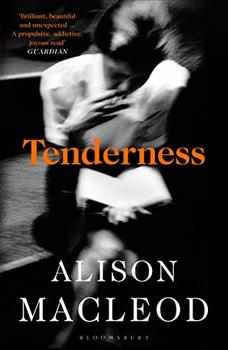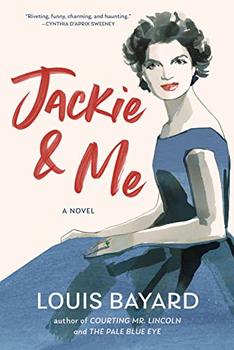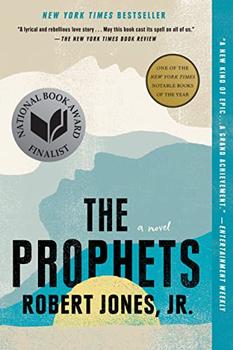Summary | Excerpt | Reviews | Beyond the book | Read-Alikes | Genres & Themes | Author Bio

Alison MacLeod's historical fiction book Tenderness considers what may have happened behind the scenes of British novelist D.H. Lawrence's life while he imagined and wrote his controversial 1928 novel Lady Chatterley's Lover.
For those unfamiliar with Lawrence's plot, young Lady Constance Chatterley is married to Lord Clifford Chatterley, but the union is compromised by Clifford's war injuries and the couple's inability to enjoy fulfilling sex or conceive an heir. Connie embarks on a passionate affair with Oliver Mellors, gamekeeper for the substantial Chatterley estate. Complications ensue, and the adulterous couple is perhaps one of the most enduring in literary history.
MacLeod opens the lens wide in her book to consider the 1959 and 1960 court challenges involving the novel (which was initially banned on charges of obscenity, see Beyond the Book). A panorama of settings includes Italy, the English countryside, London, Cambridge, Hyannis Port and New York City. Time stretches from 1915 to 1960 in an elaborate braid of real historical events and characters' private activities and thoughts.
Scattered in between descriptions of British country life during the Great War (later called World War I) and 1959 courtroom scenes are substantial quotes from the Chatterley novel, but Lawrence's experiences are almost as suspenseful as the book itself. The author lived a bohemian lifestyle supported by patrons and publications. He and his wife, German baroness Frieda von Richthofen, were accused of spying for the Germans in 1914. Their marriage was commonly known to be tempestuous and included extramarital affairs. They traveled in aristocratic and artistic circles, including the Bloomsbury group, with intellectual contemporaries like E.M. Forster, Georgia O'Keeffe and Aldous Huxley.
The narrative strands of Tenderness are complex, sometimes meandering and occasionally confusing. The novel will likely appeal most to fans of English literature, including those with an academic interest in Lawrence and his milieu. MacLeod tends towards long literary descriptions and journalistic details of place and character. In 1929 Italy, shortly after privately publishing his novel, Lawrence is shown worrying over the consequences of the book:
… his agent had wired to say he was as sure as anyone could be that Chatterley had been blacklisted by Whitehall, too secretively to fight it in the courts. It was a double blow. A secret blacklisting also meant the newspapers couldn't report it. His novel was to be starved of oxygen, like his own feeble lungs. […] Then, even worse news from his agent—how could it be? No one in London would provide assurances that he, the author and distributor, would not be arrested if he returned to England.
With an omniscient vantage point that zooms in and out, MacLeod's characters are well-wrought, although there are so many side characters that I am challenged to sort them out. The author has clearly done deep historical research to render details of setting, character and language throughout her substantial 640-page novel.
By today's standards, Lawrence's sexual banter and four-letter words might be considered quaint. Had he lived during the latter half of the 20th century, he would likely have embraced the "make love not war" cries of the countercultural 1960s and 1970s and attended festivals like Woodstock or Burning Man. Other 20th century authors, including Henry Miller, Marguerite Duras, Anaïs Nin and Erica Jong also engaged frankly with unconventional varieties of erotic and gender expression. MacLeod's treatment in Tenderness is entirely sympathetic to this type of freedom and personal liberation. A subplot involves a long-time love affair between two powerful men; other vignettes show how some people who read Lady Chatterley's Lover embarked on new sexual relationships.
Sections of Tenderness include fictionalized appearances of the historical figures Jacqueline Kennedy, young wife to John F. Kennedy, and J. Edgar Hoover, longtime director of the FBI. Tension springs from (closeted homosexual) Hoover's determination to thwart Senator Kennedy's 1960 bid for President against Richard Nixon. MacLeod opens up the inner life of Jacqueline — her insecurities about motherhood, and her uncertain role in the powerful Kennedy clan. As MacLeod constructs, she was a fan of the Chatterley novel, and attended one of the court hearings in Manhattan, where the FBI took a photo of her holding the banned book.
Fictionalizing public figures allows novelists like MacLeod to consider possible hidden aspects of the real person. Jacqueline Kennedy navigates personal and public challenges with poise and grit. Arch-villain, paranoid and power-hungry J. Edgar Hoover poses threats to literary and artistic expression, to personal human liberties and to the entire free world. Hoover has it in for Barney Rosset, founder of Grove Press, a publisher of Lawrence's work, and is determined to manipulate the full overt and covert powers of the FBI to prevent the "smutty" novel from being distributed by the U.S. postal system.
Nestled within MacLeod's encyclopedia are two tender love story vignettes. In 1959, Cambridge literature student Dina meets historical archivist Nick. Their sexual love affair ignites in the archives, where Nick shares a copy of the original Chatterley with Dina, who will play a key role in defending the novel during the British obscenity trial. Another passionate love connection develops between diligent former FBI agent Mel Harding and Hyannis Port motel receptionist Cathleen.
Macleod argues for literature as a force for social and cultural change. Competing notions of "right" and "wrong" are played with by novelists and artists. The existence of such work may be backed by courts of law, academic institutions, conferences, theatres and museums. Yet, it is essential to understand that freedom of expression continues to be terribly and imperfectly negotiated in many parts of the contemporary world, where impassioned people weaponize their beliefs with war or vigilante justice.
Tenderness calls to mind A.S. Byatt's Possession and Tolstoy's Anna Karenina. The dance between historic fact, plausible maybes and imagination is also reminiscent of Rodham or American Wife by Curtis Sittenfeld. Themes include self versus society, nature versus industry, freedom of expression, power, varieties of marriage and sexuality, and censorship. What is the role of literature? Perhaps it is to imagine and iterate possible outcomes, without actually killing the enemy, the marriage or the beloved.
![]() This review
first ran in the November 17, 2021
issue of BookBrowse Recommends.
This review
first ran in the November 17, 2021
issue of BookBrowse Recommends.

If you liked Tenderness, try these:

by Louis Bayard
Published 2023
Master storyteller Louis Bayard delivers a surprising portrait of a young Jackie Kennedy as we've never seen her before.

by Robert Jones Jr.
Published 2022
A singular and stunning debut novel about the forbidden union between two enslaved young men on a Deep South plantation, the refuge they find in each other, and a betrayal that threatens their existence.
When men are not regretting that life is so short, they are doing something to kill time.
Click Here to find out who said this, as well as discovering other famous literary quotes!
Your guide toexceptional books
BookBrowse seeks out and recommends the best in contemporary fiction and nonfiction—books that not only engage and entertain but also deepen our understanding of ourselves and the world around us.